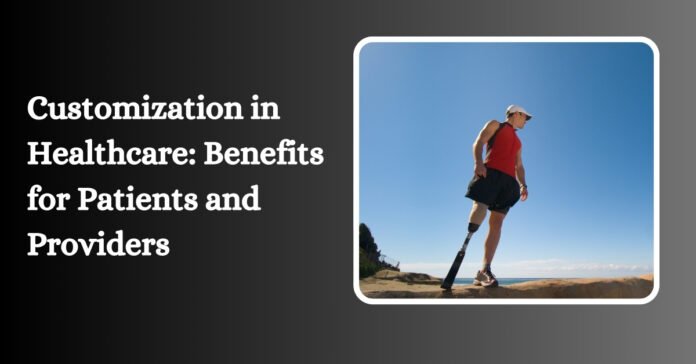
In the dynamic of today’s healthcare, customization has emerged as a revolutionary force, particularly in prosthetics and personalized treatments. This concept involves creating tailored solutions that address the unique needs of each patient, enhancing their quality of life, mobility, and overall satisfaction. From advanced prosthetics controlled by the mind to affordable, 3D-printed devices in underserved regions, customized healthcare solutions are redefining patient experiences worldwide. This article delves into the advantages of customization in modern healthcare, emerging trends, and the substantial benefits it offers to both patients and providers.
What is Customization in Modern Healthcare?
Customization in modern healthcare refers to the adaptation of medical treatments, devices, and services to fit individual patient requirements. This approach improves patient care by offering personalized solutions, such as prosthetics crafted for specific anatomical features or treatments designed based on genetic profiles. For example, advanced prosthetics now integrate technology that allows users to intuitively control their movements, significantly enhancing their quality of life.
Moreover, customization fosters better engagement between patients and providers, ensuring that prosthetics care plans reflect patients’ unique circumstances, preferences, and goals. Ultimately, this personalized approach leads to a more effective, patient-centered healthcare system.
Emerging Trends in Healthcare Customization
1. Advanced Technologies in Prosthetics
Innovations like artificial intelligence (AI) and machine learning are transforming prosthetics. These technologies analyze patient movement patterns and adjust prosthetics for optimal function. Smart prosthetics equipped with sensors can collect real-time data on a user’s movements, enabling adjustments that improve stability and comfort.
2. 3D Printing
3D printing is revolutionizing prosthetic production. This technology allows for the rapid creation of customized devices that fit each patient’s unique anatomy. Benefits include faster production times and lower costs, making custom prosthetics more accessible to those in need.
3. Telehealth and Remote Monitoring
Telehealth has gained prominence, especially following the COVID-19 pandemic. Patients can now consult healthcare providers via video or phone, facilitating easier access to care. Remote monitoring tools allow professionals to track patient progress from a distance, enabling timely adjustments to treatment plans, which supports a customized healthcare approach.
4. Personalized Medicine
This trend utilizes genetic information to develop targeted treatments. By tailoring medications and therapies to individual needs, personalized medicine leads to more effective care. In prosthetics, this means designing products that align with the patient’s specific preferences and requirements.
5. Patient Empowerment
Today, patients are increasingly taking charge of their healthcare decisions. With greater access to information, they advocate for customized solutions that meet their individual needs. This shift promotes a collaborative relationship between patients and healthcare providers.
5 Benefits of Customization for Healthcare Providers
1. Improved Patient Satisfaction
Tailored healthcare solutions lead to higher patient satisfaction. When providers address unique needs, patients are more likely to feel positive about their care, which often results in better adherence to treatment plans and improved health outcomes.
2. Enhanced Clinical Outcomes
Customizing solutions allows for more effective treatments, resulting in better clinical results. For example, a well-fitted prosthetic can significantly enhance user mobility and comfort, leading to improved overall health over time.
3. Reduced Healthcare Costs
Although customization may appear costly initially, it can save money in the long run by decreasing hospital readmissions and the need for additional interventions. This not only lowers costs but also reallocates resources to critical areas of care.
4. Competitive Advantage
In a competitive healthcare market, offering customized services can differentiate providers. Personalization attracts new patients and strengthens loyalty among existing ones, establishing providers as leaders in patient-centered care.
5. Better Data Collection and Insights
Customization enables providers to gather valuable data on patient preferences and outcomes. This information can enhance future products and services, ensuring they align with patient needs and improving overall care delivery.
6. Strengthened Patient-Provider Relationships
Taking the time to understand patient needs fosters trust and strengthens relationships. This personalized approach encourages open communication, leading to better collaboration and shared decision-making, ultimately improving adherence to treatment plans and health outcomes.
Conclusion
Customization in modern healthcare is transforming how patients receive care, particularly in prosthetics. By tailoring products and services to meet individual needs, healthcare providers can enhance patient outcomes, increase satisfaction, and improve overall care quality.
Looking forward, advancements in technology, patient empowerment, and personalized medicine will continue to drive customization in healthcare. For providers, embracing this trend offers unique opportunities to improve clinical outcomes, reduce costs, and stand out in a competitive marketplace.
By prioritizing patient-centered care and leveraging customization, the healthcare industry can deliver more effective, efficient, and compassionate solutions for all. For those seeking prosthetics that reflect their individual needs and lifestyles, partnering with a reputable prosthetics manufacturer in Delhi. Ensures access to innovative technology and tailored solutions that enhance comfort and functionality.

